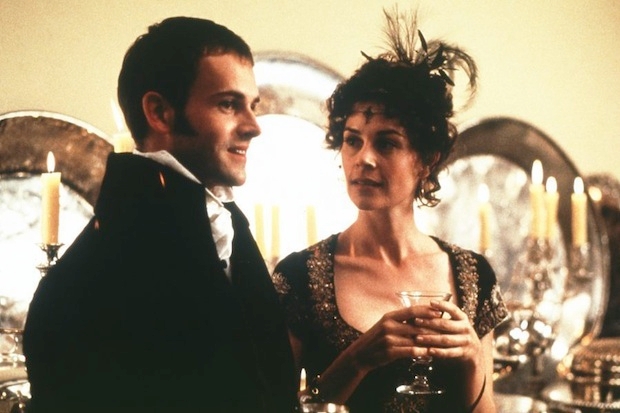When I first read Jane Austen I had an ulterior motive. I wanted to impress a girl who read her. I didn’t get the girl, but I got the novelist: persuading myself that I was the only 16 year-old boy in Newcastle who had read Jane Austen. Not yet subtle enough to appreciate the extent of how good she was, I was happy loving her heroines, ogling the country houses, trying to emulate the cads, and weeping at the broken hearts and accepted marriage proposals. Repeat this for the films and the endless BBC mini-series.
Then I discovered at university that every boy liked Austen – as did the old boys. I got the impression she was used as a beard (or a bonnet) by latently misogynistic readers who were patronising about other women writers.
Her authorial eye wasn’t rangy and blokish like George Eliot’s. But it’s the hefty, blokish readers – Vladimir Nabokov, F.R. Leavis, Martin Amis – who are most vocal in their praise. This was Nabokov in a letter to Edmund Wilson, before he liked Austen: ‘I dislike Jane, and am prejudiced, in fact, against all women writers. They are in another class. Could never see anything in Pride and Prejudice.’ (Austen could have written this – with its chiming prejudices – into the mouth of one of her famous boors.) Then Vlad read Mansfield Park, admitted it to be one of the best books ever written, and gave a two hour, chapter by chapter lecture on it. It is worth mentioning that he developed a love for Mansfield around the time he was writing Lolita. There is a silkiness to that book’s cruelty that I suspect was at least enhanced by Nabokov reading Austen.
Rereading Mansfield Park today (exactly 200 years since its publication), I think I’ve cracked why boys love Austen. For all the solidity and uprightness, her technique is all about slyness. Austen has it both ways. The prose – yes it’s very good and funny and all that – but it also does what boys of a literary bent are trained out of (in school, uni and life), but forever want to do. Austen says a lot with the most words possible. Her long, necessary sentences heap up meaning. She’s rich and economical.
We know all about Austen and irony – her dramatic and structural command of it: the way she makes fools out of her characters. But I’m talking about irony in the true sense of the word: about the characters themselves being able to occupy two positions at once. Before Mary Crawford falls for Edmund Bertram, the hero of Mansfield Park, she considers people’s expectations that she will go for his older brother, who stands to inherit the family fortune and title: ‘While she treated it as a joke, therefore, she did not forget to think of it seriously.’ Her brother Henry, who at first set out to win Fanny Price’s heart just to trifle with her, has now found himself surprisingly in love. Here, he is taken in by the lies he is telling while also admitting their falsity:
‘”I have had the pleasure of seeing your sister dance, Mr Price…” True enough, he had once seen Fanny dance… but in fact he could not for the life of him recall what her dancing had been, and rather took it for granted that she had been present than remembered anything about her.’
But here’s the most attractive double position. She’s dreamy and serious at once; thoughtful in both senses. In Mansfield she had the confidence to make her heroine sickly, quiet and immobile. Fanny Price just wanders in and out of rooms, having thoughts and impressions, but generates the motion of the book. Emma Woodhouse would be another country-house flaneur in Austen’s next novel.
Before Austen, fiction had been about action; ruminations were for poetry and philosophy. Now we have the first succinct idlers of prose – not at all out of place in an idling class. From here on in all good novels have to be both dreamy and serious. Just like a wannabe boy writer, they’re out to be lazy but taken seriously for it. In fact, this remains the ambition of recent grown-up postmodernists: to do as little as possible and write about it. Think W.G. Sebald, Ben Lerner, Karl Ove Knausgard, Teju Cole and Geoff Dyer. It’s all boys talking about themselves, locked in their heads, and they learned it from Jane Austen. And so reading Austen precipitates the development of a literary sensibility itself. For everything else, there’s the BBC Pride and Prejudice miniseries.
Jonathan McAloon is an arts journalist, and writes about anything with a pulse






Comments